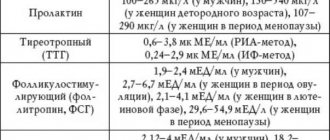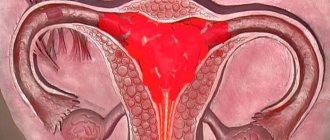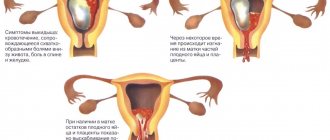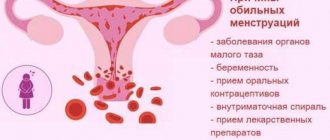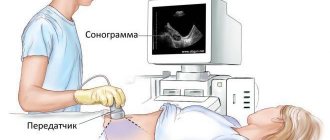Childbirth is a difficult physiological process. The birth of a baby is accompanied by a number of changes in the body. The girl must first clarify when the cycle is restored after childbirth. When carrying a baby, there is no menstruation. There are no periods yet for some time after delivery. The girl has a so-called artificial menopause. The restoration of menstruation directly depends on the state of health and the chosen method of feeding the baby. After childbirth, menstruation usually takes on a different character and abundance. At first, bloody spotting may be observed. Sometimes an urgent consultation with a doctor is required.
When a child is born, a woman's body undergoes major changes.
When does your period start after childbirth?
The time it takes for the menstrual cycle to normalize after childbirth is different for everyone. This is due to many circumstances:
- the child is on natural or artificial nutrition;
- a woman breastfeeds on demand or by the hour;
- Is the baby supplemented with formula?
- were there any difficulties during childbirth;
- whether the mother eats a balanced and nutritious diet;
- whether the woman gets enough rest and sleep;
- the mother has depression and health problems.
How is breastfeeding related to the onset of menstrual periods?
Lactation is the main factor influencing menstruation. Their arrival depends on the frequency of application of the baby to the mammary gland:
- If the child is fed formula or breastfed, but irregularly, critical days come about a month to a month and a half after birth. At the same time, ovulation does not always happen, but still the probability of an egg being released is quite high, so the chances of getting pregnant in the absence of contraception are very high;
- if feeding is organized according to a schedule, then the first menstruation may come as early as two months after birth;
- if breastfeeding occurs on demand, the appearance of menstruation is delayed by six months to a year. As a rule, critical days begin as soon as complementary foods are introduced into the baby’s diet;
The absence of menstruation after childbirth is due to changes in the woman’s hormonal levels.
- Sometimes menstruation in nursing women comes later than a year later, which is due to the individual characteristics of the body.
If your period has not come after a year, you need to exclude:
- possible pregnancy;
- hyperlactinemia is a hormonal disease characterized by an increased amount of prolactin. This hormone influences ovulation and, accordingly, the menstrual cycle.
Why are there no periods for some time after childbirth?
The reasons for the absence of menstruation during the postpartum period may be the following:
- the effect on the body of the hormone prolactin, which causes so-called lactational amenorrhea;
Lactational amenorrhea is a condition of the female body in which there is no ovulation, which is associated with lactation. The hormone prolactin is the main hormone in the process of producing breast milk and prevents the egg from leaving the ovaries. The level of estrogen also does not increase, which is why breastfeeding mothers’ periods come much later.
- inflammation of the ovaries, which can also affect a woman’s hormonal levels;
- tumor of the uterus or ovaries;
- endometriosis - proliferation of cells in the inner layer of the uterus.
During lactation, the absence of menstruation should not be scary, as this is a normal physiological process. But if a woman stops breastfeeding, and after several months menstruation has not begun, then you should definitely visit a doctor.
Absence of menstruation a year after childbirth is a reason to consult a doctor
Is it possible not to use contraception after childbirth if you haven’t had your period yet?
There is often an opinion that breastfeeding can protect against unwanted pregnancy by almost 100%. However, it is not. Lactational amenorrhea prevents ovulation from occurring. But for this method to work, the baby must be put to the breast at least every 3 hours during the day and a maximum of 6 hours at night. But even then, of course, there is no 100% guarantee.
The World Health Organization recommends starting to use contraception three weeks after birth, regardless of the presence or absence of menstruation. A woman may simply not wait until her menstruation begins, since the first ovulation will result in pregnancy.
Breastfeeding does not provide 100% protection against pregnancy
Recommendations for normalizing your cycle
When a woman is healthy, her cycle returns normally. To avoid possible failures, you need to follow some simple recommendations:
- To give the body the opportunity to quickly restore the synthesis of hormones, you need to eat well. Plenty of fruits, vegetables, whole grains and water, combined with regular exercise, is an effective method of restoring hormonal balance. The menu should include dairy products, cottage cheese, and meat. After consulting with your doctor, you can take multivitamins for nursing mothers.
- Do not take birth control pills. They can change hormonal levels and cause unpredictable changes in the cycle. If a woman is sexually active, it is better for her to use condoms or other non-hormonal methods of contraception.
- Organize your routine as efficiently as possible. If your baby doesn't sleep well at night, you should try to get enough sleep during the day. You should not refuse any help from your loved ones. A woman's good physical condition will help her recover faster.
- If you have chronic diseases (diabetes, thyroid pathology, anemia and others), you need to visit an appropriate specialist and adjust your treatment.
Duration and permissible intensity of the first and subsequent periods after childbirth
The first period after childbirth is often different from a woman's previous periods. For some, the discharge becomes more abundant, while for others, on the contrary, it becomes scanty. If irregularity in the cycle was previously observed, then after the birth of the child, as a rule, this problem disappears.
The average duration of the menstrual cycle is 28 days, but can vary from 21 to 35 days. The duration of discharge is 3–6 days, sometimes it lasts up to 8–10.
The greatest intensity of discharge during menstruation occurs in the first 2 days. If this indicator has not decreased by the seventh day or menstruation lasts more than a week, you should urgently consult a doctor.
How to distinguish lochia and bleeding from menstruation
After the birth of a child, every woman experiences bleeding, which is caused by the separation of the placenta from the uterus. It takes time to restore it (up to two months), during which the nature of the discharge changes:
- in the first 2–3 days, bleeding is observed;
- from the 3rd–4th day until the end of the first week - serous-serous discharge;
- from the 10th day - yellowish-white discharge;
- at 5–8 weeks the discharge stops.
This blood discharge is called lochia and is not menstruation. They remove everything unnecessary from the mother’s body so that the process of restoration of the uterus is completed as quickly as possible. In addition to blood, they contain particles of the endometrium, mucus, and parts of the fetal membrane. During menstruation, only blood and parts of the upper layer of the uterus leave the body; components of the placenta are absent.
The main difference between lochia and menstruation is the nature of its occurrence: the menstrual cycle is regulated by hormones, while lochia is caused by the condition of the uterus after childbirth.
Uterine bleeding is a pathological condition characterized by heavy blood loss. Unlike menstruation, it leads to general weakness, anemia, fatigue and requires qualified help.
Table: features of lochia, bleeding and menstruation
| Postpartum lochia | Period | Uterine bleeding |
| The color of the discharge is red. They then turn brownish and gradually lighten to a clear or creamy color. | During menstruation, there is always blood in the discharge. As a rule, it has a brownish color at the very beginning and end. | The color of the discharge does not change, and the volume does not decrease after several days. |
| After delivery, the discharge may continue for up to 4–8 weeks. | Your period should last no more than a week. | Uterine bleeding lasts more than a week. |
How long does it take to fully restore the normal cycle after childbirth?
The regularity of critical days after childbirth will not return immediately. Even when the first menstruation arrives, it is quite difficult to say when the next one will be. On average, the body needs 3 months after the appearance of the first menstruation for the cycle to recover. But this period is individual.
The first period after childbirth: women's experience
The first menstruation was normal. But then for six months they were irregular and more abundant than before. Afterwards, everything more or less settled down, however, there was no longer such a clear cycle and painless periods as before pregnancy, it’s a pity.
Maria
https://www.woman.ru/health/woman-health/thread/4474752/
I have passed 2.5 months after giving birth. The baby has IV, so her period started early. It just happened the other day. They were very strong. I had to use urological pads for 2 days. It was pouring heavily and there was weakness. I called the doctor who delivered the baby, he said that this could happen. According to an ultrasound 3 weeks ago, everything was fine.
Olga
https://www.woman.ru/health/woman-health/thread/4474752/
I started when my child was 7 months old (I was breastfeeding, I was even surprised), there was spotting for 5 days, then a month of calm. Then we went as usual, only the cycle lengthened, it became 35, and before pregnancy it was 28, and the bleeding itself decreased. But what I’m really very happy about is that they have become painless, before on the first day I had veins on painkillers. But PMS is now a nightmare, and before only my breasts swelled.
Olga
https://www.woman.ru/health/woman-health/thread/4474752/
I had a caesarean section, the discharge after it went away within 3 weeks. My first period came almost a year and a half later (I was breastfeeding). But the first ones were oh-oh-very plentiful, never before, as if they had been slaughtered.
Plush
https://www.babyplan.ru/forums/topic/42452-pervaya-menstruatsiya-posle-rodov/#ixzz4wlnJlK1D
Is it possible to breastfeed after the onset of menstruation?
There is an opinion that during menstruation, breast milk becomes bitter, and therefore the child may refuse to breastfeed. It is a myth. Scientists have not identified the effect of menstruation on the taste and smell of mother's milk. Mom's smell may change slightly as sweating increases during menstruation. But this problem is easily solved by more careful personal hygiene.
Another common myth regarding breastfeeding during menstruation: the amount of milk decreases on menstrual periods. Menstruation does not affect the amount of nutrient fluid produced. If the baby begins to be capricious, this does not mean that he is hungry or that he does not like the taste of milk. Most likely, the emotional state of the mother was transmitted to the baby, because often the signs of PMS (premenstrual syndrome) are aggravated in the postpartum period.
There are no contraindications to breastfeeding during menstruation.
Video: breastfeeding during menstruation
Painful or heavy periods: pathology and norm
As a rule, women who experience pain during menstruation before childbirth do not attach any importance to this after the birth of the child. Some even note that the pain has become less. But those who have not encountered this before are very worried when painful menstruation comes after childbirth. What is the reason for such changes?
Pain during menstruation in the postpartum period can be a consequence of:
- hormonal imbalances;
- organ damage during childbirth;
- caesarean section;
- inflammatory process;
- endometriosis - proliferation of cells in the inner layer of the uterus;
- oncology;
- incomplete cleansing of the uterus from the remains of the placenta.
During menstruation, a nursing woman may experience increased pain when putting her baby to the breast. This happens because sucking causes intense contractions of the uterus. And since the pain threshold is reduced during critical days, the pain is felt more strongly.
Painful periods after childbirth may indicate the development of pathology
It is recommended to visit a doctor after the first menstruation appears. This is necessary to assess the condition of the young mother’s organs and determine how they are being restored.
An urgent visit to the gynecologist's office is necessary if:
- discharge during menstruation is too heavy (maximum absorbency pads last only one hour);
- the duration of menstruation is more than 10 days;
- the menstrual cycle lasts less than two weeks;
- there are many clots in the discharge. Discharge of bright scarlet color;
- a year has passed since the birth of the child, or the woman has not breastfed for three months, and her period has not come;
- if after lochia your period comes earlier than a month later;
- The regularity of a young mother’s periods has not been restored after several menstrual cycles.
What is menstruation
Menstruation or regula is a cyclical physiological process consisting of the sequential rejection of part of the mucous surface of the uterus under the influence of hormonal levels. Since the monthly cycle is the result of the work of the endocrine system, the mechanism of its restoration after childbirth is difficult to understand if you do not have an idea about the stages of the onset of menstruation.
This is interesting. Each phase is characterized by the intensity of the production of a certain hormone: ovulatory - estradiol, luteal - progesterone.


